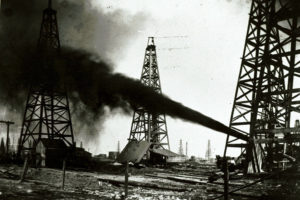From the pharaohs to John D. Rockefeller, oil has been key to the growth of civilization—but it comes at a high cost.
January 10, 2020
This January marks the 150th anniversary of the Standard Oil Company, incorporated in 1870 by John D. Rockefeller and three partners. Such was their drive and ruthlessness that within a decade Standard Oil became a vast monopoly, controlling over 90% of America’s oil refineries.

Spindletop Hill in Beaumont, Texas, was the site of the first Texas oil gusher in 1901. PHOTO: TEXAS ENERGY MUSEUM/NEWSMAKERS/GETTY IMAGES
Standard Oil’s tentacle-like grip on U.S. commerce was finally prized loose in 1911, when the Supreme Court broke it up into 33 separate companies. But this victory didn’t put an end to the nefarious activities surrounding “black gold.” In the 1920s, tycoon Edward Doheny was drawn into the Teapot Dome scandal after he gave a $100,000 bribe to Secretary of the Interior Albert Fall. Doheny served as the inspiration for the corrupt and blood-soaked tycoon J. Arnold Ross in Upton Sinclair’s 1927 novel “Oil!” (which in turned inspired the Oscar-winning 2007 film “There Will Be Blood”).
Though clearly responsible for a great many evils, oil has also been key to the growth of human civilization. As the Bible attests, bitumen—a naturally forming liquid found in oil sands and pitch lakes—was used in ancient times for waterproofing boats and baskets. It also played an important role in Egyptian burial practices: The word “mummy” is derived from mumiyyah, the Arabic word for bitumen.
Over the centuries, oil proved useful in a variety of ways. As early as the fourth century, the Chinese were drilling for oil with bamboo pipes and burning it as heating fuel. In Central Eurasia it was a treatment for mange in camels. By the ninth century, Persian alchemists had discovered how to distill oil into kerosene to make light. The oil fields of medieval Baku, in today’s Azerbaijan, brought trade and culture to the region, rather than political oppression and underdevelopment, as is often the case in oil-rich countries today.
The drilling of the first commercial oil well in the U.S., in Pennsylvania in 1859, brought a raft of benefits. In the 19th century, an estimated 236,000 sperm whales were killed to make oil for lamps. The whaling industry died overnight once Standard Oil began marketing a clean-smelling version of kerosene. Plentiful oil also made the automobile industry possible. In 1901, when a massive oil gusher was discovered in Spindletop, Texas, there were 14,800 cars in the U.S.; two decades later, there were 8.5 million.
After World War II, the world’s oil supply was dominated not by private companies like Standard Oil but by global alliances such as OPEC. When OPEC nations declared an embargo in 1973, the resulting crisis caused the price of oil to climb nearly 400%.
At the time, the U.S. depended on foreign suppliers for 36% of its oil supply. Last month, the U.S. Energy Information Administration announced that, thanks to new technologies such as hydraulic fracturing, the country had become a net exporter of oil for the first time in 75 years.
Though helpful geopolitically, America’s oil independence doesn’t solve the environmental problems caused by carbon emissions. Ironically, some of John D. Rockefeller’s own descendants, aided by the multibillion-dollar fortune he bequeathed, are now campaigning against Exxon Mobil —one of the 33 Standard Oil offshoots—over its record on climate change.





